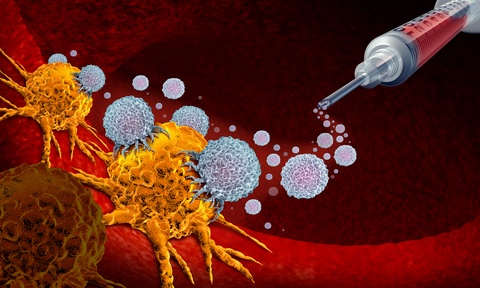Chemoimmunotherapy Called “Next Frontier” for Mesothelioma Cancer

Mesothelioma researchers in Australia are calling the combination of chemotherapy and immunotherapy the “next frontier” in the treatment of mesothelioma cancer.
In a study published in the journal Expert Opinions in Biological Therapy, the researchers reviewed past clinical trials on mesothelioma immunotherapy. They focused on studies published between 2016 and 2018.
Their goal was to get a clearer picture of just how effective these drugs are and how they might be used in combination with other treatments.
Chemotherapy for Mesothelioma Cancer
Currently, immunotherapy is not the primary treatment for mesothelioma cancer. Instead, most patients have chemotherapy, which is considered the gold standard treatment.
For the past 15 years, Alimta has been the main chemotherapy drug for people with malignant mesothelioma. It is usually administered along with a platinum-based drug called cisplatin.
Unfortunately, mesothelioma patients who just have chemotherapy only live about four months longer, on average.
But the Australian report suggests that the new class of drugs that act on the immune system may help chemotherapy work better and extend the lives of people with mesothelioma cancer.
New Drugs Focus on Immunity
These immune-focused drugs are called immunotherapy drugs. The goal of immunotherapy drugs is to enlist the help of the body’s natural defense system to fight mesothelioma cancer.
Like other types of cancer, mesothelioma cells have ways of hiding from the immune system. One of those ways is through immune checkpoints like the proteins CTLA4 and PD-L1. Immune checkpoints essentially reduce natural immune response.
In recent years, a number of studies have shown that blocking the right immune checkpoints can turn the immune system back “on” for people with mesothelioma cancer. Immune checkpoint inhibitors are drugs designed to do this.
Better Mesothelioma Cancer Treatment
The Australian team studied research on both CTLA4 blockers and PD-L1 blockers (Keytruda is an example of a PD-L1 blocker). They concluded that drugs that only block CTLA4 simply do not work for mesothelioma cancer.
On the other hand, PD-L1 blockers like Keytruda have shown promise. When given as a second treatment, they help somewhat in about 20 to 29 percent of cases. The researchers did point out that there have not yet been any randomized studies comparing a PD-L1 blocking drug with chemotherapy or placebo.
Interestingly, treatment approaches that combine both CTLA4 and PD-L1 checkpoint inhibitors may help more than either one alone. The researchers report that this combination provides “a small incremental increase in response rates and progression-free survival.”
But the real power to fight mesothelioma cancer appears to lie in chemoimmunotherapy. This is a combination of both immunotherapy drugs and chemotherapy. These two types of drugs may boost each other since they work in completely different ways. The Australian team says the powerful combination is the “next frontier” for treatment.
Source:
Nowak, AK, “Immune checkpoint inhibition for the treatment of mesothelioma”, May 2, 2019, Expert Opinions in Biological Therapy, Epub ahead of print, https://www.tandfonline.com/doi/abs/10.1080/14712598.2019.1606209?journalCode=iebt20





